What is it about musicals?
Is there any other genre so loaded with stigmatised signification? To acknowledge enjoying them is to expose oneself.
The ever brilliant Grace Lavery turned me on recently to D.A. Miller’s 1998 essay Place for Us, which traces (a certain generation of) gay men’s identification with Broadway musicals back to a commonly experienced primal scene.
Miller describes a ‘puberty rite’ immediately identifiable to me and probably to many of you who opened this post:
…boys destined, as it was said, to be musical, would descend into the basement of their parents’ home (see Figure left), and there they would sing and dance to recorded Broadway music (in one variant, merely mime singing and dancing) under the magical belief that, having lent the score the depth of their own abjection, they might then borrow all its fantastic hope that their solitary condition would end in glory and triumph.
Though each closeted kid enacted this ritual privately, ‘in secrecy and shame,’ it was somehow ‘so widely diffused as to remain, for several generations, as practically normative for gay men.’
Miller in the 1960s communed with a vinyl LP of Ethel Merman in Gypsy. By the 90s, I could put my extensive collection of Sondheim CDs on rotation and walk around the empty house singing all the lyrics to ‘A Little Priest’ or ‘A Weekend in the Country’. With my high tenor voice and repressed sense of romantic intimacy, I found my perfect avatar in Mandy Patinkin’s George, who can’t love anyone because there’s ‘a part of him / always standing by…’ – so much so that I submitted ‘Finishing the Hat’ as my addition to our school’s 1997 senior class mixtape.
Looking back from gay middle age, I’m proud of my teenage self for not pretending in front of his peers to care about contemporary pop music. (What would my alternative selection have been? Toni Braxton’s ‘Unbreak My Heart’??)
I can remember one of my classmates saying, ‘You know, Mullin, I don’t even like musicals, but that was… interesting.’
It’s been more than two decades since I came out and started working in theatre myself – but even still, I carry a degree of internalized shame at being, deep down, a show queen. Tellingly, though I’ve written shows about gay porn and HIV, it was not until last year that I started writing a fully-fledged musical.1
What held me back?
‘In the psyche of post-Stonewall man,’ Miller says, ‘the Broadway musical lies like a nervously watched pod that, having been preserved from a past geological epoch, may nonetheless—say, at any temperature above frigidity—split open to reveal a creature that, in comparison with the less primitive forms of life around it, even with those that must have evolved from it, will appear monstrous beyond recognition.’
Miller imagines a scene entering a hookup’s apartment, for the express purpose of engaging in ‘grown-up’ male-on-male sexual acts, only to discover an extensive collection of cast albums and exclaiming ‘My God, you really are gay!’ Having come out of the closet, it is no longer the predilection for sodomy that brands us, but the surviving evidence of the sissies we once were.
As I began drafting lyrics for our show last summer, the pod had definitely cracked open — and the primal childhood joy of belting out songs surged within me. I listened back through old showtunes as references, but did worry how those searches would warp my Spotify Wrapped, revealing to the world just how gay I was… Until, in the words of Howard Ashman, I thought, But who cares? No big deal. I want more!
The power – and the threat – of the musical lies in its emotional vulnerability. To witness a heroine step into the spotlight and deliver her showstopper is to witness the deepest internal doubts that most people keep mum made manifest and, in doing so, to break through them.
The musical, a genre derided for its blatant artificiality, actually traffics in the revelation of authenticity. We buy our tickets and wait with bated breath for the inevitable moment when the True Self breaks free, in song:
Something has changed within me
Something is not the same
I’m through with playing by the rules
Of someone else’s game…
2024 was quite a year for musicals. The quatrain above, sung by a misunderstood ‘wicked’ witch, could have come just as easily from the lips of the free-wheelin’ folk singer or the conflicted cartel leader who serve as the other two musical protagonists from films nominated at this year’s Academy Awards.
It’s been more than fifty years since multiple musicals has been nominated in the Best Picture lineup. And not even in the 1960s, when behemoth road show pictures like My Fair Lady and The Sound of Music were Hollywood’s blockbusters, was there a single year that featured three movie musicals competing for the top prize.
Think before you quibble with me grouping the Bob Dylan biopic A Complete Unknown together with a film about singing witches. Minute for minute, the Dylan film probably contains more singing than Wicked (which, after all, was stretched out from just Act 1 of the stage show). Moreover, both films tell the stories of singular outsiders who seek entry into arcane institutions (the upper echelons of American folk music, the hallowed halls of Shiz University) only to end up violently rejecting membership in climactic final gestures of rebellion that are each expressed through a new, radical sound.
Before seeing Wicked, I listened to the songs on Spotify and was struck by Cynthia Erivo’s somewhat restrained vocal quality in early songs like ‘The Wizard and I’ and ‘I’m Not That Girl.’ In the dramatic context of the film, though, this muted expression proves a canny character choice. For most of the film, Erivo is holding back her full vocal power because she knows where she’s headed.
The primary reason most of us bought our tickets at all was to hear ‘Defying Gravity,’ maybe even just to hear how Erivo would interpret that famous, non-verbal vocal riff that concludes the song. The film’s trailer notably gives us Elphaba’s very last lyrics in the song (‘No wizard that there is or was, is ever gonna bring me down…’) but withholds the battle cry. Everyone knows: you don’t give away the money shot.
Elphaba, like Mama Rose in Gypsy, has become a role that every diva must put their own stamp on. Erivo could not simply replicate Idina Menzel’s signature ‘Ah-AH-ah-ah!’ but instead delivers a longer run with additional syllables. Her cry comes from the guts and feels even rawer and more liberatory — especially after the 2 hours and 40 minutes we’ve waited for it.
In the film, Elphaba’s final breakthrough is hard won. Her broom does not immediately fly but first falls precipitously from the Emerald City’s tower. The jolt that she needs to ultimately defy gravity comes from a last minute vision of her younger self (that ostracized kid in the basement again), plummeting alongside her. When Elphaba’s full-fledged belt emerges at last, we interpret it not as something new but a voice within that has lain dormant within her. The egg has finally cracked, and the power of her real self is unleashed.
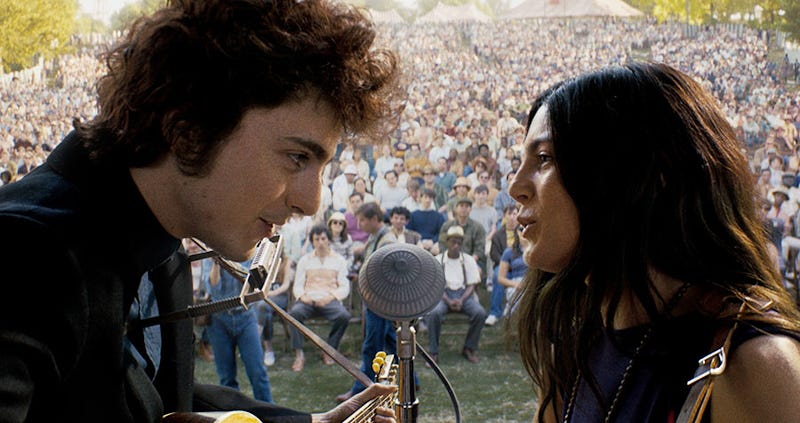
By contrast, when Timothée Chalamet’s Bob Dylan ‘goes electric’ at the 1964 Newport Folk Festival, he plummets head first into accusations from the folk establishment that he has abandoned the authenticity of his early music. This scene, as heavily foreshadowed and indulgently distended as ‘Defying Gravity’ is in Wicked, fulfills much the same function. Both sends our protagonists blasting out of the confining milieu in which they were raised, now free agents with lonely, tumultuous futures ahead of them.
Just as girls and gays were primed to dissect every note of Erivo’s performance, Boomer men no doubt bought tickets to A Complete Unknown with trepidation about how this twink might soil their idol’s legacy. Chalamet’s singing may lack Erivo’s vocal pyrotechnics, but it walks an equally risky tightrope.
In contrast to other musical biopics like Bohemian Rhapsody, here Timmy does his own singing, which he further proved by performing as the musical guest on Saturday Night Live in Dylan vocal drag. In a film that pivots around contested questions of authenticity, he could hardly have done anything else.
Dylan has one of the most recognizable (and easily imitated) voices in the history of recorded music. In scene after scene, the ugly growl of this shambling man-boy continually holds listeners rapt. His sometime lover Joan Baez may sound pretty singing hand-me-down ballads, but he offers audiences something new: the prophetic voice of a singer-songwriter, whose currency is not its purity of tone but the expressive, enigmatic poetry of his lyrics.
As played by Chalamet in charismatic fuckboy mode, it can seem as if Dylan cribs his persona’s constituent parts — the folk idiom, the vague gestures at liberation politics — from the women around him, only to discard them when the celebrity of rock music turns his head. The eternal paradox of Dylan is how his undeniably distinctive voice, which seems to ‘speak for a generation,’ could emerged from someone who fundamentally lacks an authentic self.
And speaking of cynical manipulation…
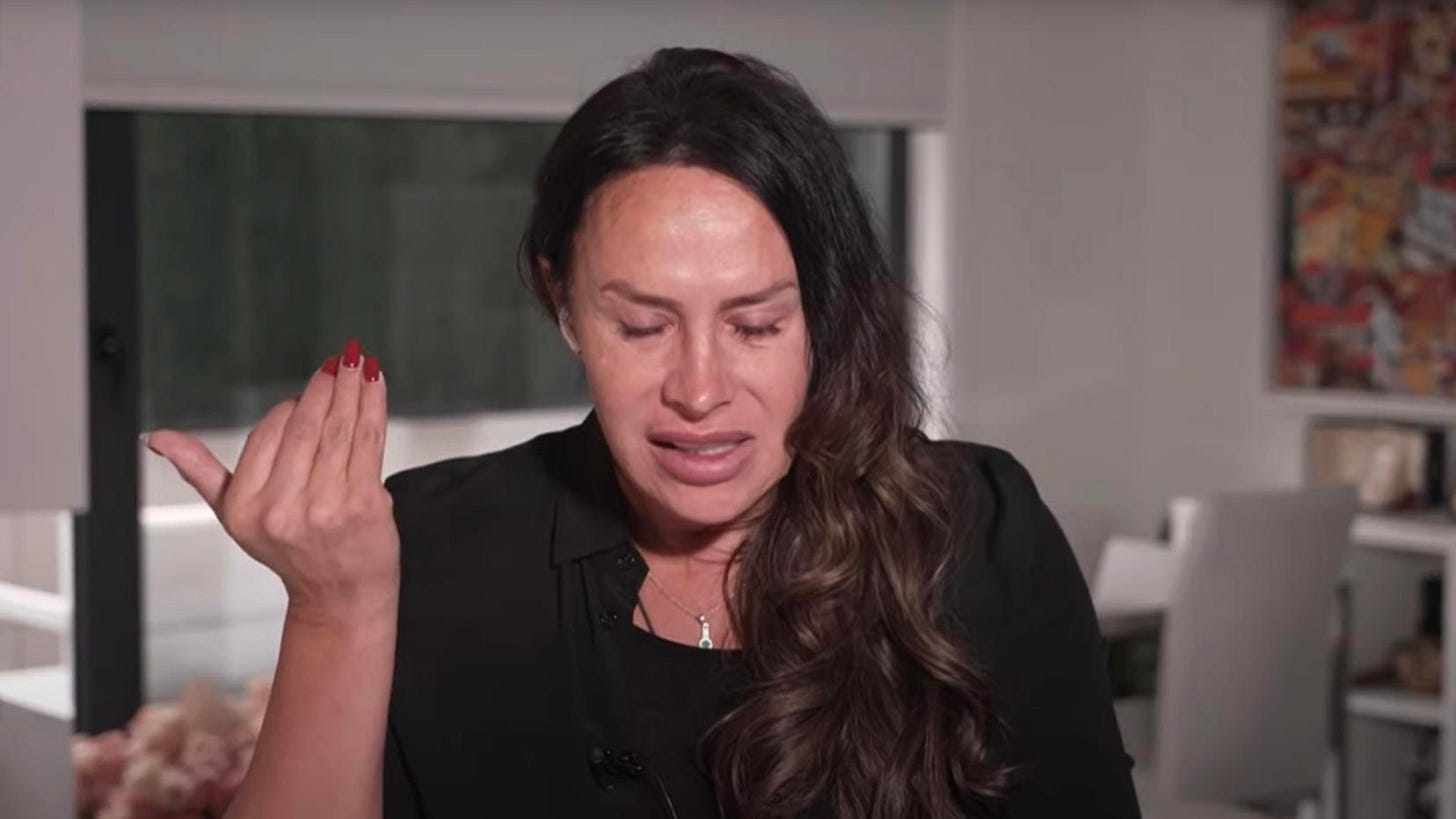
Emilia Pérez is a mess.
As a narrative, as a political statement and — ultimately — as a publicity campaign, its elements are at war with one another.
The first time you heard about it, someone probably said, ‘So it’s a French movie but set in Mexico, about a drug cartel boss who’s also transgender. Plus it’s a musical.’
That last factoid gets tacked on as the coup de grâce that catapults the project out of the realm of the absurd and into the laughable. Yet, as a fan of a show about Victorian cannibalism, I don’t think that any subject is necessarily off-limits to musicalisation. My disdain for Emilia Pérez doesn’t stem from the supposedly outrageous humour of its easily memeable (and mockable) vaginoplasty number.
Rather, the film’s problems stem from its deployment of the most sincere musical theatre tropes. Take, for instance, the song ‘Deseo,’ which any student of Broadway will immediately identify as an ‘I Want’ number. We’ve entered this story through the POV of Rita (Zoe Saldaña), a lawyer who’s forcibly dragged into meeting with a fearsome and secretive cartel boss known as ‘Manitas’ (Karla Sofía Gascón).
Like Rita, we’re initially disoriented about the nature of the highly sensitive job for which she’s being recruited, which turns out to be arranging top-secret gender-affirming surgery. But when Gascón sings ‘Deseo,’ the writers hope to shine light on the inner depths behind the gruff, violent exterior.
The character — like many musical theatre protagonists before — opens up about their heart’s desire, in rudimentary lyrics that could have come from my middle school Spanish class:
No me falta el cielo
No me falta el mar
No me falta la voz
Pero me falta cantar(I don't lack the sky
I don't lack the sea
I don't lack a voice
But I lack singing)
The distinction between voice and singing is crucial. At this point in the story, ‘Manitas’ croaks out the song in a low, masculine tone. It’s barely even singing at all. We’re meant to infer that this character’s true voice sounds different, and Rita’s assistance will help access it. The lyrics go on to say, ‘I want another face,’ ‘I want another skin’ and (in an especially clunky image) ‘I want the depth of my soul to smell like honey.’
Ariel in The Little Mermaid also longed for a different form, trading fins for legs. But the person who will soon be called Emilia Pérez longs for an even more fundamental transformation. ‘Let everything that I was no longer be,’ the song continues, ‘My only desire is to be her.’
Is this a song of gender dysphoria, or of moral regret – or both? It is here that the film’s logic starts to go off the rails. When Emilia wakes from surgery, she seems to have become not only a woman, but a completely different person. Her pre-transition self was broadly and vaguely sketched in cruel and violent terms. Now, having affirmed her femininity and posing as the cartel boss’s sister, she decides to start an NGO that recovers the bodies of victims ‘disappeared’ in the cartel wars. (Makes a certain amount of sense, right? Who’d know better where they are than the person who oversaw the killings?)
Do the filmmakers view gender transition as a… metaphor? Are we to understand the character’s shift from masculine to feminine as a transition from the Universally Violent into the Universally Benevolent? It should be noted that Emilia doesn’t contemplate giving up the vast wealth, multiple mansions or staff of servants acquired from her previous life as a criminal mastermind. She and Rita are lauded for work that is, in fact, a form of evading justice.
So far, so simplistic. The middle section of the film, in which ‘Tía Emilia’ keeps her true identity secret from her ex-wife Jessi (Selena Gomez) and kids even whilst living with them, shares a sentimental sitcom vibe with Mrs. Doubtfire. Even in allegedly tender moments, the incoherent gender essentialism peeks through, as when one of the kids sings to Emilia, ‘You smell like Papa. / You smell like the mountains, like leather and coffee.’ Remember how she wanted her soul to smell like honey? Honestly, WTF.
Soon, though, old emotions surge within Emilia, prompting the vestiges of her previous self to resurface. And her voice is the tell. When Jessi reveals that she’s remarrying and plans to claim the kids, her kindly ‘sister-in-law’ snaps instantly. As if possessed by an older demon, Emilia’s voice drops down into its previous low register as she violently shoves Jessi onto a bed and growls, ‘You can go fuck your mother, with your fucking pimp, but my children stay here!!’
Possessiveness and aggression still reside in Emilia but they are coded as ‘masculine’ traits that she has not shaken off. As a characterisation, this gender Manicheaism is completely reductive; as a representation of actual trans lives it’s utterly laughable. From this point on, Jessi and her boyfriend retaliate against Emília, leading to kidnapping, severed fingers and gunfights, with all three characters’ lives ending in a violent conflagration.
By the end, as a statue of Emilia is paraded through the streets by mourning extras, one has to ask: who does this movie think it’s fooling? The last sequence depicts the title character — a deceptive, emotionally volatile murderer — venerated as a martyr. The only sensible reading is one of irony. The poor, powerless Mexican masses have been duped into believing a narrative of sainthood… just as so many audiences and awards bodies appeared to be since this film premiered at Cannes.
But if anyone was uncertain about the hollowness of this film’s ‘trans allyship,’ that’s been made undeniably clear in the film’s Oscar campaign, which ended, just like the film, in an abrupt, destructive car crash. As you most likely know, an enormous number of indiscriminately offensive tweets from lead actress Gascón resurfaced, much like the demonic ‘Manitas’ voice in the film. And she’s only made the situation worse in unhinged and unauthorised interviews trying to defend herself.
But its not only the actress’s mask that dropped. Her filmmaking colleagues from Netflix execs and director Jacques Audiard on down have (understandably?) refused to appear with her and cut off most of the financial support for her awards campaign. It becomes hard to advance the film’s purported message of ‘allyship,’ when the cis filmmakers have rendered their team’s sole trans member invisible.
Emilia Pérez will live on as a tawdry ‘own-goal’ story tailor-made for the next edition of Michael Schulman’s Oscar Wars. Its inadvertent value as a cultural narrative may be to dispel the notion that gender transition is a form of moral rehabilitation. Real-life trans women, like everyone else, are contradictory and worthy of three-dimensional representations — which they themselves have authored.
Cis-het director Audiard looked to the exoticism of a Mexican trans narrative to explore some half-baked intellectual ideas of good and evil. And he lacked the musical filmmaking chops to even render it as camp.
Meanwhile, in basements around the world, young trans and queer kids are belting out songs by otherworldly witches and mermaids that tap into relatable feelings of otherness and abjection but also ready them to survive as their authentic selves.
One or more of those kids will turn their own stories into song. That’s what I want to buy a ticket for.
It’s coming along well, thanks! More on that another time…






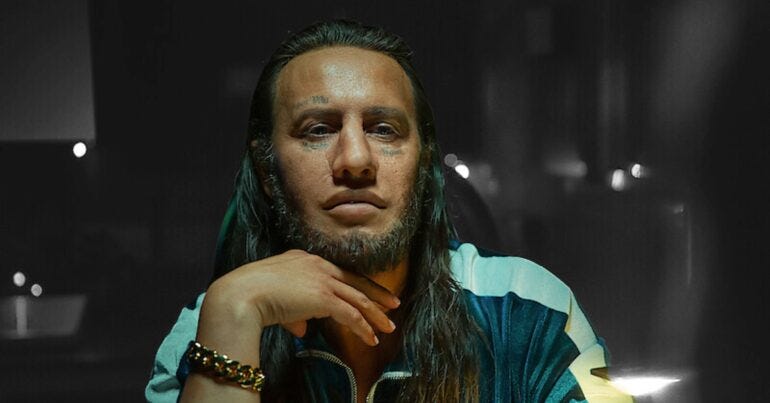
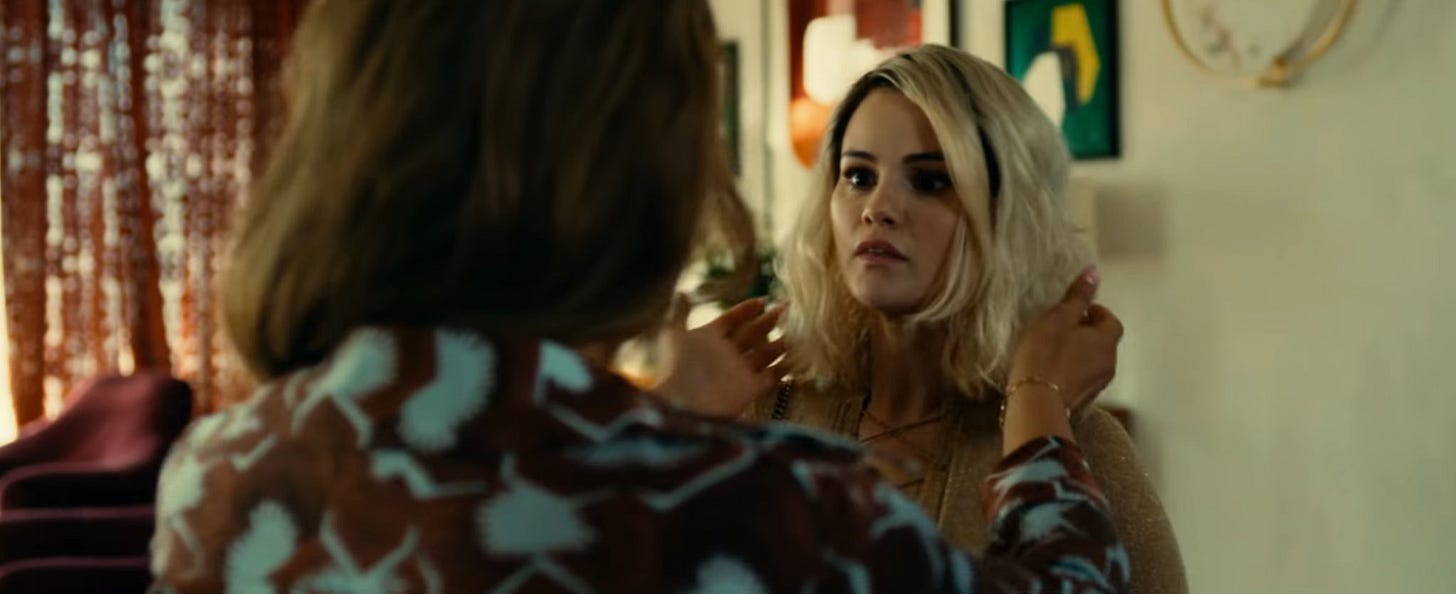
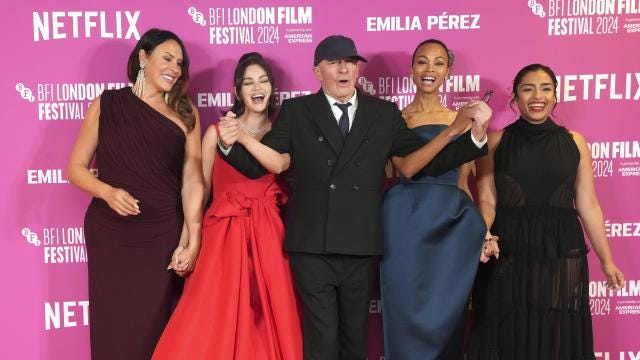
♡♡♡
😍🔥